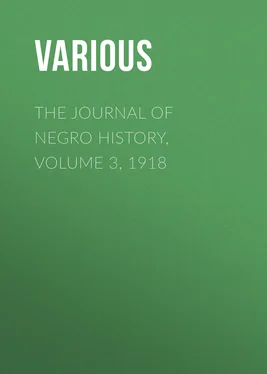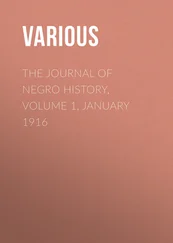Various - The Journal of Negro History, Volume 3, 1918
Здесь есть возможность читать онлайн «Various - The Journal of Negro History, Volume 3, 1918» — ознакомительный отрывок электронной книги совершенно бесплатно, а после прочтения отрывка купить полную версию. В некоторых случаях можно слушать аудио, скачать через торрент в формате fb2 и присутствует краткое содержание. Жанр: foreign_antique, periodic, История, foreign_edu, на английском языке. Описание произведения, (предисловие) а так же отзывы посетителей доступны на портале библиотеки ЛибКат.
- Название:The Journal of Negro History, Volume 3, 1918
- Автор:
- Жанр:
- Год:неизвестен
- ISBN:нет данных
- Рейтинг книги:5 / 5. Голосов: 1
-
Избранное:Добавить в избранное
- Отзывы:
-
Ваша оценка:
- 100
- 1
- 2
- 3
- 4
- 5
The Journal of Negro History, Volume 3, 1918: краткое содержание, описание и аннотация
Предлагаем к чтению аннотацию, описание, краткое содержание или предисловие (зависит от того, что написал сам автор книги «The Journal of Negro History, Volume 3, 1918»). Если вы не нашли необходимую информацию о книге — напишите в комментариях, мы постараемся отыскать её.
The Journal of Negro History, Volume 3, 1918 — читать онлайн ознакомительный отрывок
Ниже представлен текст книги, разбитый по страницам. Система сохранения места последней прочитанной страницы, позволяет с удобством читать онлайн бесплатно книгу «The Journal of Negro History, Volume 3, 1918», без необходимости каждый раз заново искать на чём Вы остановились. Поставьте закладку, и сможете в любой момент перейти на страницу, на которой закончили чтение.
Интервал:
Закладка:
Various
The Journal of Negro History, Volume 3, 1918
The Journal of Negro History
Vol. III—January, 1918—No. 1
THE STORY OF JOSIAH HENSON 1 1 On account of ill health Mr. W. B. Hartgrove, who was preparing this article, had to turn over his unfinished manuscript to the editor, who completed it. The story is based on the " Life of Josiah Henson ," " Father Henson's Story of His Own Life " and " Uncle Tom's Story of His Life ."—The Editor.
No one ever uttered a more forceful truth than Frederika Bremer when she said in speaking to Americans: "The fate of the Negro is the romance of your history." The sketches of heroes showing the life of those once exploited by Christian men must ever be interesting to those who would know the origin and the development of a civilization distinctly American. In no case is this more striking than in that of Josiah Henson, the man who probably was present to Harriet Beecher Stowe's mind when she graphically portrayed slavery in writing "Uncle Tom's Cabin."
Josiah Henson was born June 15, 1789, on a farm in Charles County, Maryland, where his mother was hired out. His parents had six children. The only recollection he had of his father was that of seeing his right ear cut off, his head gashed and his back lacerated, as a result of the cruel punishment inflicted upon him because he had dared to beat the overseer of the plantation for brutally assaulting the slave's wife. Because of becoming morose, disobedient and intractable thereafter, Henson's father was sold to a planter in Alabama and his relatives never heard of him again. His mother was then brought back to the estate of her owner, a Doctor McPherson, who was much kinder to his slaves. Dr. McPherson gave the youth his own name, Josiah, and the family name Henson after Dr. McPherson's uncle, who served in the Revolutionary War. Josiah showed signs of mental and religious development under the pious care of his Christian mother and for that reason became his master's favorite.
Upon the death of Doctor McPherson, however, it became necessary to sell the estate and slaves to divide his property among his heirs. The Henson family was then scattered throughout the country and worst of all Josiah was separated from his mother, notwithstanding his mother's earnest entreaty that her new master, Isaac Riley, should also purchase her baby. Instead of listening to the appeal of this afflicted woman clinging to his hands, he disengaged himself from her with violent blows. She was then taken to Riley's farm in Montgomery County. Josiah was purchased by a man named Robb, a tavern keeper living near Montgomery Court-House. Both masters were unusually cruel, in keeping with the tyrannical methods employed by planters of that time. Because of ill health resulting from the lack of proper care, Josiah became very sickly. He was then providentially restored to his mother, having been offered to her owner by Robb for a small sum, for the reason that it was thought that he would die.
His third master was "vulgar in his habits, unprincipled and cruel in his general deportment and especially addicted to the vice of licentiousness." 2 2 Henson, " Uncle Tom's Story of his Life ," p. 15.
On his plantation Henson served as water-boy, butler and finally as a field hand, experiencing the usual hardship of the slave. He ate twice a day of cornmeal and salt herring, with a little buttermilk and a few vegetables occasionally. His dress was first a single garment, something like a long shirt reaching to the ankles, later a pair of trousers and a shirt with the addition of a woolen hat once in two or three years and a round jacket or overcoat in the winter time. He slept with ten or a dozen persons in a log hut of a single small room, with no other floor than the trodden earth, and without beds or furniture. In spite of this, however, Henson grew to be a robust lad, who at the age of fifteen could do a man's work. Having too more mental capacity than most slaves, he was regarded as a smart fellow. Hearing remarks like this about himself, Henson became filled with ambition and pride, and aspired to a position of influence among his fellows.
At times Henson would toil and induce his fellow slaves to work much harder and longer than required to obtain from their master a kind word or act, but these efforts usually produced no more from their owner than a cold calculation of the value of Josiah to him. When, however, the white overseer of this plantation was discharged for stealing from his employer, Josiah had shown himself so capable that he was made manager of the plantation. In this position his honest management of the estate made him indispensable to his master also as a salesman of produce in the markets of Georgetown and Washington. He had during these years come under the influence of an anti-slavery white man of Georgetown and had become a devout Christian with considerable influence as a preacher among the slaves.
About this time, Josiah was serving his master in another capacity, which brought upon him one of the greatest misfortunes of his life. This was accompanying his master to town for protection and deliverance when the owners of his order indulged in excessive drinking and brawls in taverns. Sometimes in removing his master from the midst of a fracas, he would have to handle his owner's opponent rather roughly. On one occasion when Riley became involved in a quarrel with his brother's overseer, Henson pushed the overseer down; and falling while intoxicated the overseer suffered some injury. The overseer decided to wreak vengeance on Henson for this. Finding Henson on the way home one day the overseer assisted by three Negroes attacked him, beating him unmercifully and left him on the ground almost senseless with his head badly bruised and cut and with his right arm and both shoulder blades broken. Being on a farm where no physician or surgeon was usually called, Henson recovered with difficulty under the kind treatment of his master's sister; but was never able thereafter to raise his hands to his head. The culprit did not suffer for this offense, as the court acquitted him on the grounds of self-defense.
In the course of time Henson's master, Isaac Riley, lived so extravagantly that he became involved in debt and lawsuits which heralded his ruin. Seeing his estate would be seized, he intrusted to Henson in 1825 the tremendous task of taking his 18 slaves to his brother, Amos Riley, in Kentucky. Henson bought a one-horse wagon to carry provisions and to relieve the women and children from time to time. The men were compelled to walk altogether. Traveling through Alexandria, Culpepper, Fauquier, Harper's Ferry and Cumberland, they met on the way droves of Negroes passing in chains under the system of the internal slave trade, while those whom Henson was conducting were moving freely without restriction. On arriving at Wheeling, he sold the horse and wagon and bought a boat of sufficient size to take the whole party down the river. At Cincinnati some free Negroes came out to greet them and urged them to avail themselves of the opportunity to become free. Few of the slaves except Henson could appreciate this boon offered them, but he had thought of obtaining it only by purchase. Henson said: "Under the influence of these impressions, and seeing that the allurements of the crowd were producing a manifest effect, I sternly assumed the captain, and ordered the boat to be pushed off into the stream. A shower of curses followed me from the shore; but the Negroes under me, accustomed to obey, and, alas! too degraded and ignorant of the advantages of liberty to know what they were forfeiting, offered no resistance to my command." "Often since that day," says he, "has my soul been pierced with bitter anguish at the thought of having been thus instrumental in consigning to the infernal bondage of slavery so many of my fellow-beings. I have wrestled in prayer with God for forgiveness. Having experienced myself the sweetness of liberty, and knowing too well the after misery of a great majority of them, my infatuation has seemed to me an unpardonable sin. But I console myself with the thought that I acted according to my best light, though the light that was in me was darkness." 3 3 Henson, " Uncle Tom's own Story of his Life ," p. 53.
Интервал:
Закладка:
Похожие книги на «The Journal of Negro History, Volume 3, 1918»
Представляем Вашему вниманию похожие книги на «The Journal of Negro History, Volume 3, 1918» списком для выбора. Мы отобрали схожую по названию и смыслу литературу в надежде предоставить читателям больше вариантов отыскать новые, интересные, ещё непрочитанные произведения.
Обсуждение, отзывы о книге «The Journal of Negro History, Volume 3, 1918» и просто собственные мнения читателей. Оставьте ваши комментарии, напишите, что Вы думаете о произведении, его смысле или главных героях. Укажите что конкретно понравилось, а что нет, и почему Вы так считаете.












